The process to acquire knowledge can further be analyzed as – ascending or descending. Ascending process of acquiring Knowledge In the ascending process, one relies on one’s own strength and efforts. This includes making observations and generalizing them with the
Read moreAuthor: Learn Gita Live Gita
Why Did Krishna Choose Dialogue Over Miracles in the Bhagavad Gita?
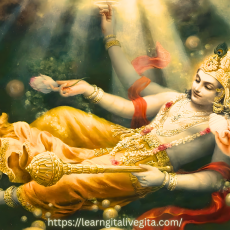
When Arjuna stood on the battlefield of Kurukṣetra, his heart trembling and his bow slipping from his hands, Lord Krishna could have easily performed a miracle. With a mere glance, He could have removed Arjuna’s sorrow, changed the course of
Read morePurpose of Life
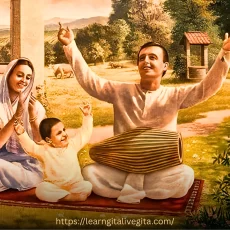
Hare Krishna! In this world of competition, many people have created their own purpose of life. The modern generation often remains unaware of the true purpose of life. Simply copying someone else’s goal does not guarantee the same happiness. Let
Read moreVedic Insights on Time Management
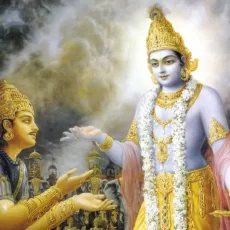
Hare Krishna! In today’s society, time management has become an essential topic for many motivational, political, and social speakers in various conferences and meetings. Although time plays a crucial role in our lives, we often waste it despite knowing its
Read moreDivine Art of Staying Calm Under Pressure
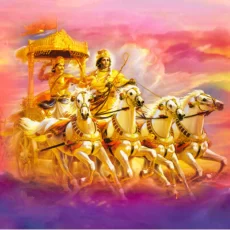
Hare Krishna!! Being conditionally bound by our duties and many responsibilities, many a times we feel suffocated and cannot escape frustrating and annoying occasions. It seems as if we get packed up in a chamber of frustrations. How annoying it
Read moreGlorious Haridwar Retreat 2025

Sadhu sanga, sadhu sanga, sadhu sanga, sarva sashtra kahe! lava matra sadhu sanga, sarva siddhi haya!! Hare Krishna!! This Summer Haridwar Retreat of LGLG Community envokes out the necessity of Devotees’ Association. This retreat was held on 22th to 28th
Read moreBhagavad Gita On Spirituality
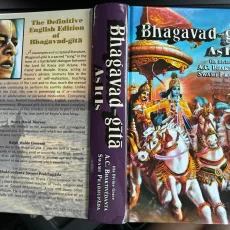
Hare Krishna!! Modern society, today, have a very wrong conception regarding spirituality. Modern agenda regarding Spiritualilty has now become “chhodo ghar dwar, chalo haridwar.” Many misconceptions regarding Spirituality are now growing widely among various age groups. let’s discuss more about
Read moreBhagavad Gita on Detachment and Professional Success
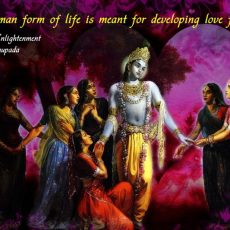
Hare Krishna!! Modern days’ agenda is: NO success means NO input given. Everyone wants success in one shot. Many of us fail in our attempts several times. Yet we do not know the process of success. Let us start with
Read moreTimeless Truths from The Bhagavad-Gītā

Bhagavad Gita is the most brilliant star on the horizon of the spiritual sky. It is the science of the soul, contrary to all other bodies of knowledge that are subject to change. This body of knowledge contained in the
Read moreEmbracing Change: Lessons From The Bhagavad Gita For Personal Growth
There is a famous saying that “There is nothing permanent except Change”. Yes it is, everything in this material world is prone to change. It could be a small thing to bigger one eg. our behaviour, body, circumstances, relationships, climate,
Read moreUnderstanding Maya through Bhagavad Gita
Hare Krishna!! We all are engrossed by three tight knots of illusory energy. Nobody, in this material world, can deny it. How this illusory energy works?? Obviously, we should know about it, so that we can get out of the
Read moreUNDERSTANDING THE THREE GUNAS: SATTVA, RAJAS AND TAMAS IN THE BHAGAVAD-GĪTĀ
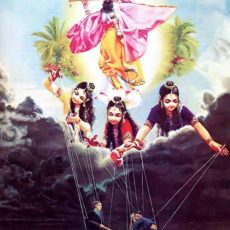
Material nature consists of three modes of material nature : goodness, passion and ignorance. We we as living entities are originally pure and eternal having a blissful nature in connection to Krishna but due to our contact with material nature
Read moreCharacter Building: Important Parameter Of Development
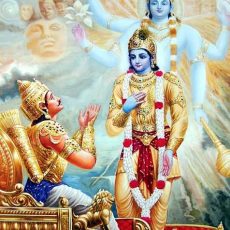
Hare Krishna!! – Development is what everyone seek for. Nobody wants to go progressing towards a negative slope. If we want to check anyone’s progress, we judge him by the qualities or qualifications he acquire. What will be the utility
Read moreYOUTH MINDS
YOUTH MINDS Hare Krishna!! Today, we all are celebrating National Youth Day. Youth, no doubt, plays an important role in our Indian infrastructure. Today, youths are driven by modernity, modern thoughts. Although, it leads to build their personality and shape
Read moreMoving Towards an Auspicious Life!!!
Moving Towards an Auspicious Life!!! Hare Krishna!! Our lives are filled, today, with the poison of inauspiciousness. No matter how proudly we deny, we are dying every moment with anxieties, doubts, fears and unstablility. Everytime, we practice new and new
Read moreMissing The Real and Ultimate Goal
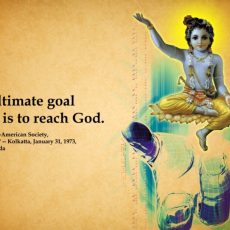
Missing The Real and Ultimate Goal Hare Krishna!! Big big targets- that is what we all set up in our life. Not denying, we all have big goals. And we endeavor a lot to achieve these goals. We face a
Read moreDiscovering Our Life’s Purpose with Bhagavad Gita
Discovering Our Life’s Purpose with Bhagavad Gita Hare Krishna!! Modernity is running towards shaping its very purpose. In modern civilisation, there came various means adopted to attain perfection. But, does gaining perfection by modern means cultivate our real purpose of
Read moreCHARACTER BUILDING: IMPORTANT PARAMETERS OF DEVELOPMENT
IMPORTANT PARAMETERS OF DEVELOPMENT Hare Krishna!! Development is what everyone seek for. Nobody wants to go progressing towards a negative slope. If we want to check anyone’s progress, we judge him by the qualities or qualifications he acquire. What will
Read moreVisiting the Holy Dhama
Visiting the Holy Dhama Hare Krishna!! We all are interested to go outside for a visit or tour. We like to have a visit with our family members. It is a great fun with them. Let’s have a short discussion
Read moreSpiritualising our Mood of Competitiveness!!!
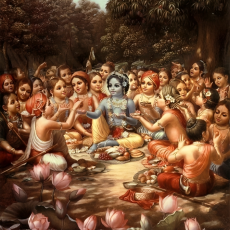
Hare Krishna!! This material world is a civilization of competition. We cannot live without being competitive. It is our natural tendency. Students, businessmen, artisans, etc. work with tending to come out as the best. Let us talk on this topic
Read moreŚrī Kṛṣṇa- Unborn or Born | LORD KRISHNA’S Divine Advent & Its Principles
(Janmashtami Special) Śrī Kṛṣṇa- Unborn or Born | LORD KRISHNA’S Divine Advent & Its Principles Introduction Everything is transcendental & beyond our material calculations, whether it be His Name, Form, Qualities, or pastimes of The Lord. There is no tinge
Read moreKrishna’s Loving Family
Krishna’s Loving Family Hare Krishna!! We all have a tendency to build relationships, good relations!! We all want loving relationships: of mother, father, friends, etc. Nowadays, our lives are going through complexities of modernization. Sometimes, our good relations, even that
Read moreASKING QUESTIONS IS A PROGRESS
ASKING QUESTIONS IS A PROGRESS Hare Krishna!! We all have a tendency to ask questions. We sometimes ask from our parents, friends, classmates, colleagues, etc. Children always have a list of questions in front of seniors. This we do to
Read moreReal Education
Real Education Hare Krishna!! Nowadays, we all have a lot of sources of getting knowledge about anything. For this purpose, there are several institutions all over the world. Modern culture of urbanisation has now made it accessible to get knowledge
Read moreOUR ETERNAL ABODE- HOME SWEET HOME
OUR ETERNAL ABODE- HOME SWEET HOME Hare Krishna!! We all have desires to have good relationships with our family members. And we also feel proud of it. We all seek good family support whether we are in our happiness or
Read moreRelishing Eternal Nectar In Material Body
Relishing Eternal Nectar In Material Body Hare Krishna!! We all want to taste the daily bread of happiness. Long-lasting pleasure!! We’re always eager to hear news. Good news!! Nowadays, there is a trend of Daily Updates. We seek happiness in
Read moreEXAMINATIONS IN SPIRITUAL JOURNEY
EXAMINATIONS IN SPIRITUAL JOURNEY Hare Krishna!! We all have faced examinations in our lives. School exams, entrance exams, competitive exams, national level exams and so on!! Obviously, most of us get a face-to-face meeting with exam-phobia ghost. This we cannot
Read morePenances For Self-Realisation
PENANCES FOR SELF-REALISATION Hare Krishna!! Modern generation, nowadays, is a generation of competitions. No Competition means No Advancement. It is obvious that to stay longer in competition, we have to pay a huge cost. Enough time and money to invest
Read moreOUR CHOICE: BOON OR CURSE
Our Choice: Boon or Curse – Hare Krishna!! As we all know, globalisation is increasing exponentially all across the globe with widespread connections. It has made accessible our approach to varieties of products. Not denying the fact that Variety is
Read moreWho is The Supreme- The Supreme Authority?
Who is the Supreme – The Supreme Authority – Hare Krishna!! Today’s modern generations are in a competitive zone. Competitions are everywhere; in every zone, field or level- society, district, national and so on. Competitions for being THE BOSS or
Read moreAm I a leader??
Am I a Leader – Hare Krishna!! As we all know that modern era is full of competitions. Without competitiveness zone, how could we understand that we are modernizing ourselves. We all seek to become a leader, a worldwide known
Read moreNEED OF ASHRAM!! NEED OF SPIRITUAL CULTURE!!
NEED OF ASHRAM!! NEED OF SPIRITUAL CULTURE!! Hare Krishna!! Gone are the days when people used to live close to Mother Earth!! People have a very connected life with nature and their spirit. Now, it is displaced by smartphones newspapers
Read moreUnraveling the Concept of Detachment in the Bhagavad Gītā
In our daily life, we all go through the two phases or dualities of life. We all want to relish its one phase, but say ‘NO’ to the other phase. We all want to seek good relationships with our friends,
Read moreThe Alchemy of Transformation: Personal Growth in the Bhagavad Gita
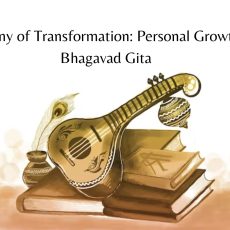
The Bhagavad Gita, often referred to as the “Song of the Divine,” is a timeless spiritual text revered for its profound teachings on life, duty, and personal growth. Within its verses lies a treasure trove of wisdom that transcends time
Read moreTop 10 Modern Applications of the Bhagavad Gita’s Teachings
Top 10 Modern Applications of the Bhagavad Gita’s Teachings – In today’s challenging world, unsettling events can serve as reminders of the darkness and dangers around us. Nevertheless, the Bhagavad Gita urges us to embrace our responsibilities earnestly, draw strength
Read moreभगवद्गीता से नेतृत्व के 10 प्रमुख सूत्र
भगवद्गीता से नेतृत्व के 10 प्रमुख सूत्र – भगवद्गीता नेतृत्व का एक अदृष्ट उदारहण है क्योंकि भगवद्गीता जो कि स्वयं कृष्ण द्वारा बोली गयी कृष्ण ने अपना बचपन एक ग्वाल बाल के रूप मे बिताया फिर मथुरा जाकर कंस जैसे
Read moreEmbarking on a Journey Through Bhagavad Gita’s Stories: Unveiling Spiritual Wisdom
Embarking on a Journey Through Bhagavad Gita’s Stories: Unveiling Spiritual Wisdom – Step into the profound world of the Bhagavad Gita, where timeless stories and parables paint a vibrant picture of self-discovery and divine connection. This sacred text, nestled within
Read moreभगवद्गीता के शांति प्रदान करने वाले १० प्रमुख श्लोक
भगवद्गीता के शांति प्रदान करने वाले १० प्रमुख श्लोक – भगवद्गीता समस्त वेदों का सार है तथा यह वेदों का प्रमुख उपनिषद है | यह स्वयं भगवान के मुख से अवतरित हुई है | जिस प्रकार गंगा भगवान के चरणकमलो
Read moreTop 10 Quotes From Lord Krishna in Bhagavad Gita
Top 10 Quotes From Lord Krishna in Bhagavad Gita – The Bhagavad Gita is the greatest of India’s ancient spiritual classics. It is the essence of Vedic knowledge and one of the most important Upanisads in Vedic literature. If we
Read moreभगवद गीता के अनुसार हमारा धर्म और कर्तव्य
भगवद गीता के अनुसार हमारा धर्म और कर्तव्य – Hare Krishna भगवद गीता के अनुसार हमारा धर्म और कर्तव्य भगवद्गीता को गीतोपनिषद भी कहा जाता है। यह वैदिक ज्ञान का सार है और वैदिक साहित्य का सर्वाधिक महत्वपूर्ण उपनिषद,है ।
Read moreअध्याय ११ – विराट रूप ( सार )
अध्याय ११ – विराट रूप ( सार ) – अध्याय दस मे श्रीकृष्ण के ऐश्वर्य का वर्णन है तथा अध्याय दस के अंत मे भगवान अर्जुन से कहते है कि मैं अपने एक अंशमात्र से सम्पूर्ण ब्रहमांड मे व्याप्त होकर
Read moreThe Importance of a Guru in Learning Bhagavad Gita
The Importance of a Guru in Learning Bhagavad Gita – Hare Krishna! As a devotee of Lord Sri Krishna, I believe that the Bhagavad Gita is not just a text, but a living guide to a fulfilling and meaningful life.
Read moreImportance Of Guru
जो अंधकार का निरोध करता है, उसे गुरु कहा जाता है । सच्चा गुरु भगवान का प्रतिनिधि होता है, और वह केवल भगवान के बारे में ही कहता है और कुछ नहीं। सच्चा गुरु वही है , जिसकी रुचि भौतिकवादी
Read moreहमें भगवत गीता कब पढ़नी चाहिए
जैसा की हम जानते है कक हमारे देश मे हर शुभ कार्य को करने का मुहूतय होता है जैसे हववाह मुहूतय, गृहप्रवेश मुहूतय, लगन मुहूतय और कोई भी शुभ काम जैसे नर्ा व्यवसार् आरंभ करना हो अथवा बालक का प्रथम
Read moreBhagavad Gita Chapter 2 Summary – Contents of the Gītā Summarized
In Chapter 1 of the Bhagavad Gita, Arjuna sees his near and dear ones, teachers, and friends on the opposing side of the battlefield, ready to sacrifice their lives in the war. He becomes overwhelmed with grief and compassion, loses
Read moreअध्याय ८ – अक्षरब्रहम योग (सार)
अध्याय ८ – अक्षरब्रहम योग (सार) – अध्याय ७ के अंत मे श्रीकृष्ण बताते है कि मनुष्य किस प्रकार ज्ञान अर्जन करें ? जिससे वह पूर्णता को प्राप्त कर भगवद्धाम वापस जा सके | अष्टम् अध्याय मे श्रीकृष्ण बताते है
Read moreअध्याय ५ : कर्म – संन्यास योग
अध्याय ५ : कर्म – संन्यास योग – भगवद्गीता के पंचम अध्याय मे भगवान बताते है कि भक्तिपूर्वक किया गया कर्म, शुष्क चिंतन से बेहतर है | तृतीय अध्याय मे बताया गया कि जो व्यक्ति ज्ञान मे स्थित है उसके
Read moreNarasimha Chaturdashi Celebrations 2021

Narasimha Chaturdashi Celebrations 2021 – To propagate and make devotees imbibe this wonderful feeling of devotion to Narsimha Deva, ‘Learn Gita Live Gita’ along with the devotees from ISKCON Bhagwat Geeta Pathshala Dehradun, BGIS Vrindavan, ISKCON Ranchi, IIT Kanpur, and
Read moreReincarnation: A Matter of Chance or a Matter of Consciousness (08.06.2021)
Reincarnation: A Matter of Chance or a Matter of Consciousness (08.06.2021) – A conditioned soul has a certain consciousness and according to that consciousness, the Supersoul brings it to the semen of a man and guides it to the womb
Read moreThe Original Source: Bhagavad-Gita Perspective
The Original Source: Bhagavad-Gita Perspective – The most fundamental question in science, especially in physics is “ What is the origin of everything? ”. Physicists are trying to find the answer to this question. It may be surprising to some
Read more